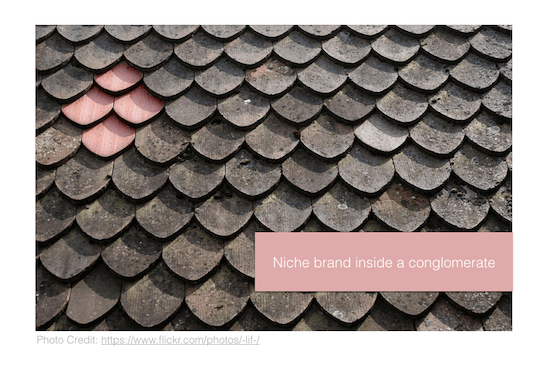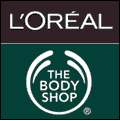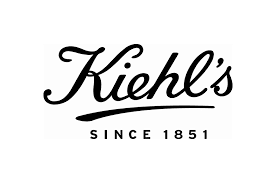There are a number of industries where the big titans seem to prefer buying up small niche brands rather than grow their own. If the internal innovation isn’t sufficient and the organic growth is not enough, the natural option quickly becomes external acquisition. This would be very much the case of the advertising business. It’s also true for the beauty business, to name a second industry. But is buying up a niche brand a successful strategy? Can a big multinational conglomerate manage to augment appropriately the value of a niche brand? Will the niche brand not be swallowed up in a sea of corporate headaches? Does shareholder value trump brand values?
What are you trying to achieve?
When evaluating the success of the acquisition of a niche player by a big conglomerate, from my perspective, the key is to understand the objectives of the purchase. In the beauty business where I worked for so many years, I observe that the reasons for buying a brand may include buying a new formula, a specific know-how (retail, eCommerce…), an acquihire, and/or access to a different customer segment. It can also be a defensive ploy to fend off a competitor. As such, success in integration of the niche brand may not and should not be gauged solely on sales.
The marriage of conglomerate and niche brand
By and large, I believe that the acquisition of niche players can work if you limit the analysis to increased sales. But this may come at the expense of the customer, current employees and a niche cult and culture. On the positive side, the conglomerate brings to the smaller player the opportunity to do a full-scale rollout, access to major distribution outlets and new territories. As a result, the ‘return on investment’ can seem to be justified from a shareholder perspective. However, the indie feel and essence is necessarily subsumed by the forces of growth, the institution of corporate policies and the sharing of formulas. Another factor to bear in mind is why the indie brand actually entered into agreement to be purchased. These motivations (money, profitability, ambitions, lifestyle choices…) can also reveal how and why the niche brand will or will not keep its indie essence.

The pitfalls
Many independent niche brands are winning because they are not ‘big’ business. In the due diligence of an acquisition, the acquirer must not conflate the opportunity to scale a small brand with the desirability of the niche positioning in the eyes of the customers. One of my strong convictions about the power of a brand lies in the ability for the internal culture of the brand to be different. This means having a set of behaviours, a language and a largely unwritten code of conduct that starts with the employees and is consistently applied throughout with all the stakeholders, through the partners and out to the customer base. Inside large organizations, however, shared services, HR policies, protocols and personnel, have an inexorable suffocation of the niche brand from within.
How to stay true to the roots?
In my opinion, there are a few keys for keeping a niche brand authentic and true to its roots.
authentic and true to its roots.
- Leave the niche player’s headquarters geographically apart from the main HQ
- Keep the founder(s) actively on board as long as possible
- Don’t rely on conglomerate personnel to run the new business
- Focus first and foremost on customer loyalty, not on customer acquisition
- Keep the R&D separate to avoid formula ‘osmosis’
On the last point, it is all too tempting to ‘steal’ the niche brand’s formulas and spread them out across the other brands in the Group. As a result, the initial point of difference will inevitably become diluted. On the other hand, the other risk is applying “corporate” guidelines to the niche R&D labs; that can all but snuff out the genuine point of difference of a formula.
In my opinion, a privately held upscale company with a less ambitious (short-term oriented) owner, has a better chance of successfully keeping the indie brand true to its origin. For the rest, unless the criteria cited above are applied, you can usually expect a rather quick assimilation into the conglomerate ambiance.
Near-term pressures
In general, the pressure to grow (i.e. to satisfy shareholder return) inevitably explodes or dissipates the “niche” feel of the brand, especially if the founder is no longer participating actively in the daily running of the brand. For the big conglomerates, if the brand stays too niche or does not contribute sufficiently, it becomes an “issue”.
 For L’Oreal*, with the acquisition of The Body Shop, the stated intention was very much to respect its independence. The given objectives at the time of acquisition were to gain a foothold in the “natural” beauty segment and to learn about retail. The Body Shop headquarters are still based in London and the current Body Shop CEO still reports directly into the Group CEO. However, over time and especially as the results have not matched up with expectations, there has been an increasing and inevitable ‘lorealization’ of the brand, its formulas and personnel. The temptation or need to secure performance makes this a regular facet of the ongoing integration.
For L’Oreal*, with the acquisition of The Body Shop, the stated intention was very much to respect its independence. The given objectives at the time of acquisition were to gain a foothold in the “natural” beauty segment and to learn about retail. The Body Shop headquarters are still based in London and the current Body Shop CEO still reports directly into the Group CEO. However, over time and especially as the results have not matched up with expectations, there has been an increasing and inevitable ‘lorealization’ of the brand, its formulas and personnel. The temptation or need to secure performance makes this a regular facet of the ongoing integration.
Examples of niche brands retaining their indie “feeling” can be found, but the question is whether, internally, management is actually ‘happy’ with the results. The good news is that they may have retained their “small” feel; but the bad news is that the return on equity may not be up to management expectations. Examples that come to mind of smaller brands that still feel ‘indie’ include Bumble & bumble (to a lesser extent AVEDA) at Estee Lauder, although Aveda is no longer exactly ‘niche.’ For L’Oreal, they have been buying up lots of small brands. But their ambition systematically overtakes the “small and cozy” sense that comes from these niche brands.
Small and I like it that way…
To a large degree, niche brands are intentionally small and exclusive and, somewhat purposefully, are not designed to please all. That’s what the customers often appreciate: the originality, exclusivity, intimacy, customer-knowledge, proximity… There are the unique formulas, but it’s also very much about a point of view, a think different personality, a tone. People are looking for a set of characteristics in small brands that are literally antithetical to the conglomerate. And, from the multinationals perspective, that’s generally the spirit that they genuinely want to acquire. However, it’s a far cry from what usually happens. Fortunately, it is not always a disaster!
Some fine examples exist
Among beauty brands, I would identify Burt’s Bees (Clorox) as a nice example of a yet “niche” brand since it keeps up with a brand-relevant tone. Some of the refined “prestige” brands, such as Aqua di Parma (LVMH) and Jo Malone (Estee Lauder), seem to remain “distinct” and original. I would note that having standalone stores is clearly an important success factor for Jo Malone. Meanwhile, I believe the Kiehls, also with its own stores, has been a shining counter example within the L’Oreal portfolio. [Afterwards, it depends how one categorizes “niche”!] As far as I read it, however, the minute the acquiring organization applies its model, unless they are used to managing genuine luxury, the end game is systematically all about volume and market share. In conclusion, overall I’d say: Few niche brands with a genuine sense of purpose, defending a noble cause with honesty and integrity, manage to keep their ideology intact when part of a large enterprise. Click To Tweet
yet “niche” brand since it keeps up with a brand-relevant tone. Some of the refined “prestige” brands, such as Aqua di Parma (LVMH) and Jo Malone (Estee Lauder), seem to remain “distinct” and original. I would note that having standalone stores is clearly an important success factor for Jo Malone. Meanwhile, I believe the Kiehls, also with its own stores, has been a shining counter example within the L’Oreal portfolio. [Afterwards, it depends how one categorizes “niche”!] As far as I read it, however, the minute the acquiring organization applies its model, unless they are used to managing genuine luxury, the end game is systematically all about volume and market share. In conclusion, overall I’d say: Few niche brands with a genuine sense of purpose, defending a noble cause with honesty and integrity, manage to keep their ideology intact when part of a large enterprise. Click To Tweet
*Full disclosure: I worked for L’Oreal 1993-2009, but uniquely in the professional products division serving hairdressing salons.










